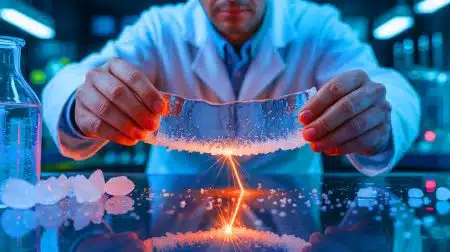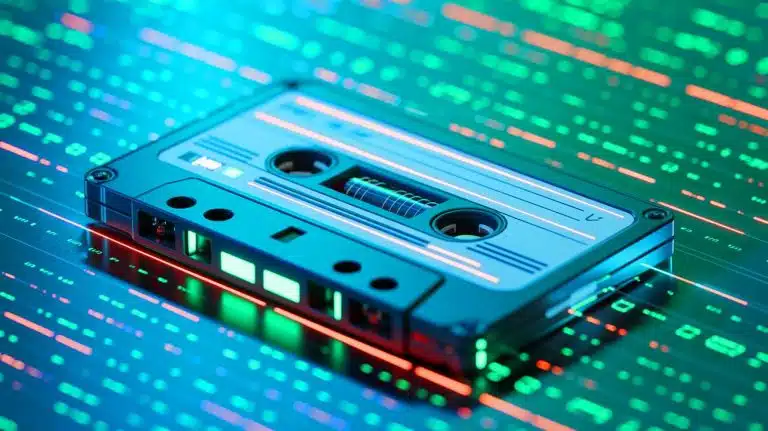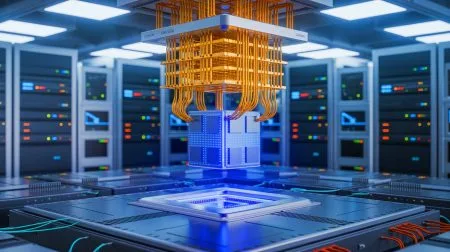| IN A NUTSHELL |
|
The relentless growth of digital data is a challenge that has spurred scientists to explore innovative solutions. Traditional storage options, like hard drives, are rapidly approaching their limits, prompting a quest for alternatives. Enter DNA, the molecule that holds the blueprint of life, now being harnessed in experimental “DNA cassette tapes.” This revolutionary approach promises to store vast amounts of data in a tiny, durable format. Scientists from the Southern University of Science and Technology in China have developed this technology, potentially offering a sustainable and efficient solution to the global data storage crisis.
Understanding DNA as a Storage Medium
The concept of using DNA for data storage is both intriguing and promising. DNA’s high density allows it to store immense quantities of information in a compact form. For instance, the DNA within a single human cell can theoretically hold up to 3.2 gigabytes of data. This capacity is equivalent to approximately 6,000 books or 1,000 songs, showcasing its potential as a storage medium.
Unlike traditional storage solutions, DNA does not degrade over time and can last for thousands of years. This longevity makes it an attractive alternative. However, the challenge lies in making DNA storage practical and accessible. The new development of a DNA cassette tape is a step toward overcoming this hurdle, drawing inspiration from the audio tapes of the 80s and 90s. By translating digital data into DNA sequences, scientists can store data much like a computer’s binary code.
The DNA cassette tape utilizes a physical tape made from a polyester-nylon blend, onto which barcode patterns are printed. These patterns create millions of tiny, addressable sections, allowing for efficient data retrieval. A protective crystalline layer ensures the data remains intact, offering a robust storage solution that operates without electricity.
System’s Functionality and Efficiency
The DNA cassette tape system’s functionality has been successfully demonstrated in laboratory settings. Researchers showcased its ability to quickly store and retrieve a digital image, affirming its efficiency in large-scale data storage. The system operates through a fully automated closed-loop process, involving addressing, recovery, and file deposition within 50 minutes.
Remarkably, a single 328-foot DNA cassette tape could hold over 3 billion songs, a capacity far exceeding traditional cassette tapes. Furthermore, the prototype device is expected to handle up to 36 petabytes of data, equivalent to the storage of 36,000 hard drives. This scalability underscores DNA’s potential to revolutionize data centers, offering a more sustainable and energy-efficient solution for storing vast amounts of information.
The DNA cassette technology not only addresses the storage capacity issue but also reduces the energy consumption associated with traditional data storage methods. By operating without the need for continuous power, it presents a more environmentally friendly option for managing the ever-increasing volumes of digital data.
UK’s Sea Dagger Autonomous Craft Deploys 12 Commandos at 46 MPH Using Trusted Mission AI Technology
Challenges and Future Prospects
While the potential of DNA storage is immense, several challenges remain. One primary concern is the cost associated with synthesizing and sequencing DNA, which currently limits the widespread adoption of this technology. However, as advancements continue, it is anticipated that these costs will decrease, making DNA storage more accessible.
Another challenge is the speed at which data can be written to and read from DNA. Current methods are relatively slow compared to traditional storage solutions. Researchers are actively working to improve these processes, aiming to enhance the practicality of DNA as a viable storage medium.
Despite these challenges, the future of DNA storage looks promising. As scientists refine the technology, it could potentially transform industries that require long-term data storage, such as healthcare, finance, and entertainment. The ability to store data securely and sustainably for centuries could redefine the way we think about and manage information.
The Broader Implications of DNA Storage
The development of DNA cassette tapes not only addresses the immediate data storage crisis but also opens new avenues for research and innovation. By leveraging nature’s blueprint, this technology exemplifies the intersection of biology and technology, paving the way for further breakthroughs.
Moreover, the implications of DNA storage extend beyond data preservation. This technology could inspire novel approaches to other challenges, such as secure data transmission and personalized medicine. As researchers explore the potential applications of DNA storage, it could catalyze advancements across various fields.
The integration of DNA storage into mainstream technology underscores the importance of interdisciplinary collaboration. By combining expertise from biology, computer science, and engineering, scientists can continue to push the boundaries of what is possible, ultimately enhancing our capacity to store and manage information in an increasingly digital world.
The advent of DNA cassette tapes marks a significant milestone in the quest to solve the global data storage crisis. As this technology evolves, it raises intriguing questions about the future of data management and preservation. How might DNA storage reshape industries, and what unforeseen challenges and opportunities will arise as we continue to explore the potential of nature’s most complex molecule?
Did you like it? 4.5/5 (25)







Wow, DNA cassette tapes? That’s a blast from the past with a futuristic twist! 🎶
Wait, does this mean my mixtape could literally be in my DNA? 🎶
Can this technology be used for personal data storage, or is it only for large data centers?
How soon can we expect this to be available for consumer use?
So, does this mean my old cassette player is coming back in style? 🤔
The concept is fascinating, but how cost-effective is it compared to traditional storage?
Thank you for the insightful article. I didn’t realize DNA could be used in such a way!
So, does this mean DNA can store my entire Netflix watchlist too? 😂
How long until we see DNA storage available for consumers? I’m really curious!
Interesting, but what happens if the DNA tape is damaged? Is the data lost forever?
This sounds like science fiction coming to life. Amazing!
This is the future of data storage! Amazing work by the scientists involved. 👏
Will this technology be able to replace cloud storage services?
Don’t you think it’s risky to store data in something that can potentially mutate?
If DNA storage is the future, what happens to all the current data centers? 🤔
Thank you for the article. It’s always exciting to see innovations in data storage.
Does this mean we’ll need biologists in IT departments now?
How secure is DNA storage from hackers? Can it be encrypted like digital data?
What would be the environmental impact of large-scale DNA storage facilities?
OMG! I can finally store all my cat videos sustainably! 🐱
Is this technology patented? Who owns the rights to DNA storage methods?
Sounds too good to be true. What’s the catch here?
Can we expect DNA storage to become affordable in the next decade?
How do you even begin to convert digital data into DNA sequences?
Thank you for highlighting the challenges. It’s important to understand the full picture.
Will this technology be available for personal use, or is it only for large companies?
Can this be used for secure data storage in government sectors?
How do they ensure data integrity over such a long period?
The science is mind-blowing, but practical application seems far off.
How long before we see DNA storage taking over traditional methods?
So, are we going to have DNA storage wars instead of cloud storage wars? 😂
What’s the estimated cost of storing data on DNA compared to a hard drive?
Thank you for the informative article. It’s a game-changer in data storage.
Can DNA storage be used for things like medical records?
What are the ethical implications of using DNA for data storage?
I’m skeptical. How reliable is DNA storage really?
Who knew DNA could be the answer to our storage problems? 🤯